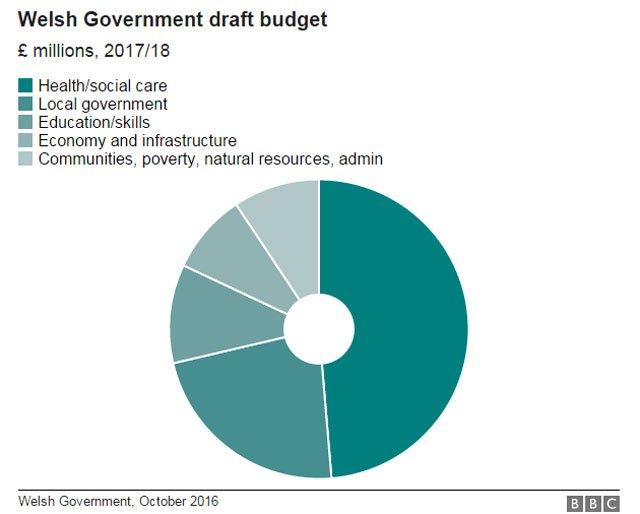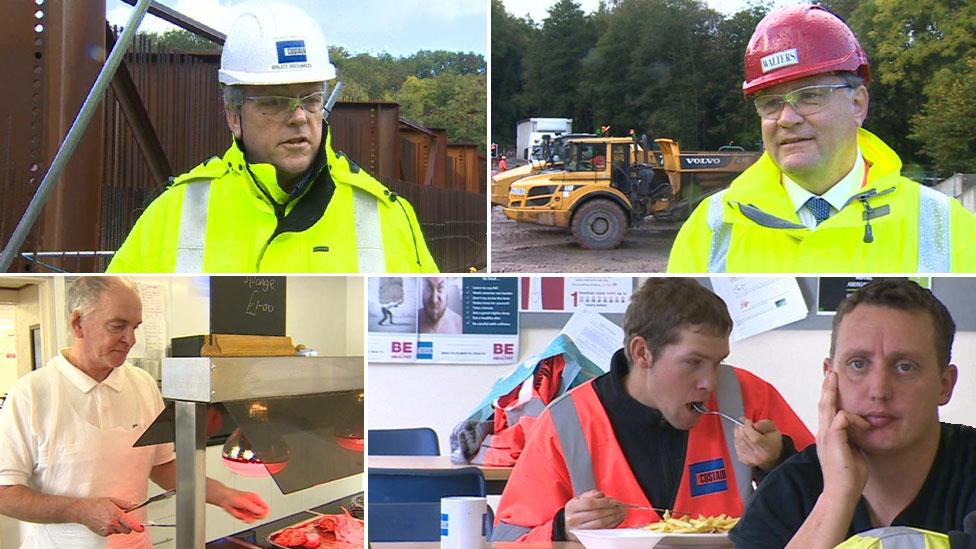How vital is the Welsh Government budget to the economy?
- Published

As we hear the details of the Welsh Government's spending plans for 2017/18, it is worth asking - how important is this actually for the whole of the Welsh economy?
The latest figures we have for value of the economy - if you look at gross value added or what we make and do - is around £54bn.
The Welsh Government budget is £14.95bn.
Any change in public sector spending can either help or hurt private businesses too.
Dr Annette Roberts, senior lecturer in economics at Cardiff Business School said: "The Welsh government budget makes up a significant share of the economy - most of the budget will go on health and social care, into local government, for education, and for the likes of road building.
"That money will flow on through use of contractors, in terms of road projects for example, through sub contractors and on through their supply chain."

The draft budget shows £15bn outlined for 2017/2018 , external- with health and social care getting nearly half that.
But that still has an impact on the economy.
"One of the big spenders is health and social care and a big part of that is wages and salaries on doctors and nurses but large amounts of money will filter through the economy to the private sector to buy services and equipment," says Dr Roberts.
"But that wage spending is also part of the equation and is really important, on those things we spend on every day. It's very tightly connected - it comes from the Welsh Government but finds its way into the Welsh economy - either directly - if you work for the public sector - or indirectly if you're in the private sector and in trading relationships with the public sector."
She said government procurement policy - what it buys - also has an impact and can support small and large companies, with implications for the economy.
Follow a road trip on the heads of the valleys showing how the money can be spent
THE HEADS OF THE VALLEYS ROAD - A JOURNEY THROUGH THE SUPPLY CHAIN
A total of £223m is being spent on widening the latest section of the A465 Heads of the Valleys road between Gilwern and Brynmawr, between a rock face on one side and a river on the other.

The chain - Costain, Walters down to workers spending money in Steve Orme's workers' canteen
There are 450 people working on site but it affects many more people than just them:
The site is run by Costain - a 150-year-old Berkshire-based building firm involved in major UK infrastructure projects. It works directly for the Welsh Government, but it then sub-contracts two thirds to a whole ream of smaller Welsh companies
The earthmoving is carried out by Walters Civil Engineering, based in nearby Hirwaun. Around 60 local people are working on the project
In turn, Walters pays other firms to carry out some of the work and it hires in extra machinery
Then with hundreds working on the project, wages get spent back in the local economy - including Steve Orme's catering business Passion for Food in Ebbw Vale
The chain continues - Steve buys 600 eggs and 30 kilos of bacon from local supermarkets and vegetables from a local supplier.
So the money that started in the Welsh Government's coffers flows on.
We now know that the Welsh Government will have less to spend in the future than it has in this financial year, at a time that inflation is beginning to rise again.
It is hoped the £111m for apprenticeships and trainees will improve the job prospects of individuals but also the vibrancy of the Welsh economy.
And while the £10m for a pilot scheme for extra childcare is undoubtedly aimed at helping more children, it will also enable more people to join the workforce and generate more wealth.
The £1.3bn over four years to create 20,000 affordable homes is another programme with dual benefits.
As well as increasing the housing stock, just as the money cascades from road builders to egg producers, that spending will increase the flow of cash through the construction industry into local businesses where workers spend their money.
- Published18 October 2016

- Published17 October 2016

- Published13 October 2016

- Published14 September 2016
